Roses are such breathtakingly beautiful flowers that just looking at them brings joy to the heart. They have always been considered the queen of flowers, admired for their fragrance and romantic symbolism. That’s why many gardeners rely on rose companion plants to enhance their beauty and protect them naturally.
When I saw them in my university park, I felt a deep sense of freshness. The gardeners were busy tending to the plants, and upon asking, they told me that rose bushes also face many challenges. To protect them from pests and diseases, companion plants are often grown alongside roses. These companions act as natural protectors.
So let’s begin—discover how you can make your garden more charming by planting not only roses but also their perfect companions.
Fragrant Friends That Keep Pests Away
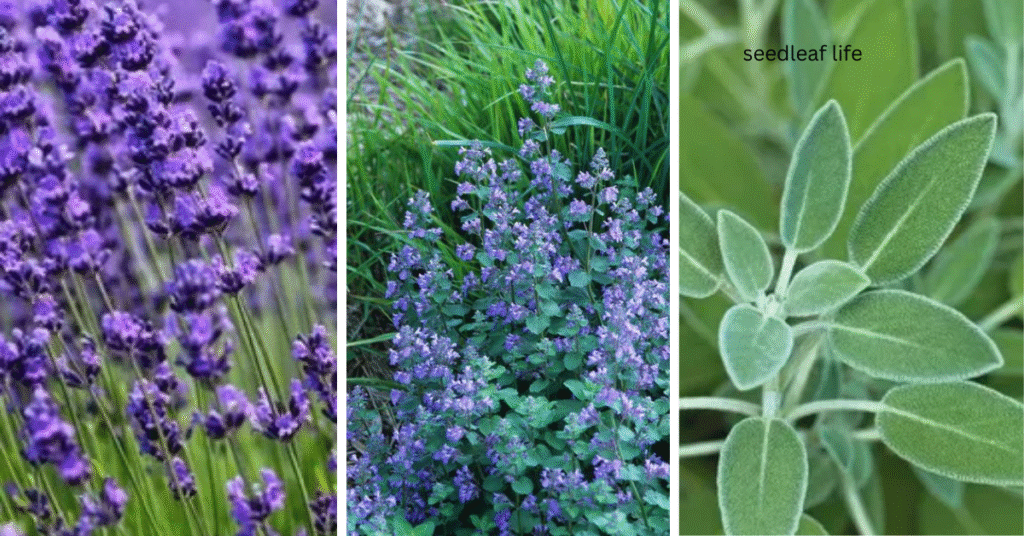
One of the biggest benefits of choosing the right rose companion plants is natural pest control. Some plants release strong fragrances that not only delight us but also confuse or repel harmful insects. At the same time, their presence adds extra charm to a rose garden.
Lavender is a truly beautiful plant and one of the best companions for roses. Its soothing fragrance fills the entire garden with peace and calm. The strong aroma also repels harmful insects that often disturb rose bushes.
Catmint (Nepeta) is another fragrant plant that works like a shield. Its aromatic leaves deter Japanese beetles and other pests, keeping rose bushes healthier.
Sage also plays a dual role: its fragrance enriches the garden experience, and its natural oils discourage insects from attacking tender rose leaves.
Together, these fragrant companions create a protective barrier around roses, making the garden not just beautiful but also resilient.
Colorful Blooms That Complement Roses
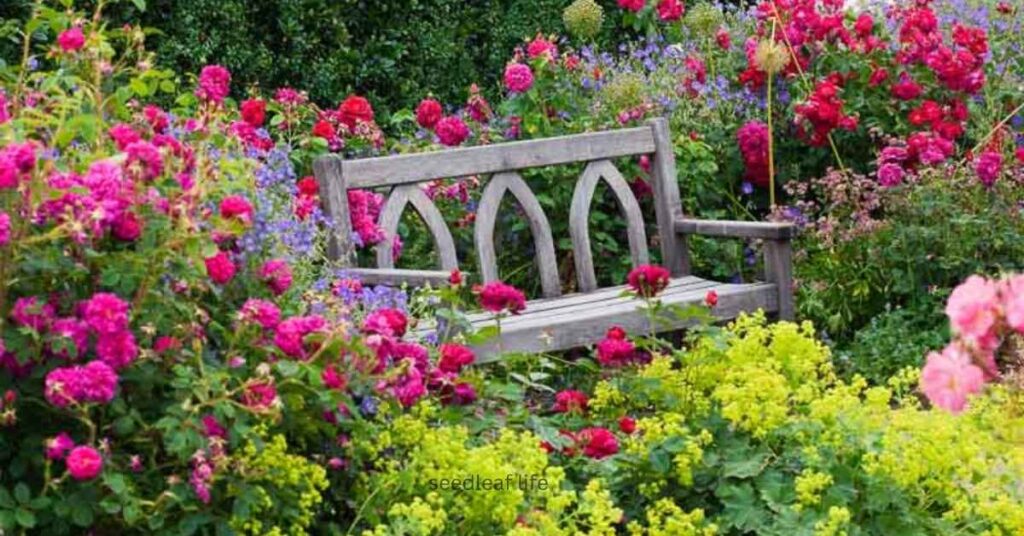
While roses often steal the spotlight, pairing them with vibrant flowering plants as rose companion plants makes the entire garden come alive. Bright companions not only highlight the elegance of roses but also invite pollinators, ensuring a healthier and more lively outdoor space.
Marigolds are cheerful flowers in shades of yellow and orange. Beyond their beauty, they help repel soil-borne pests, creating a safer environment for delicate blooms to flourish.
Geraniums add both color and protection. Just think about it, Their clusters of flowers in shades of pink, red, and white create harmony with roses while also discouraging unwanted insects from settling on the plants.
Foxglove is a beautiful flowering plant that is mostly grown in gardens as an ornament. It is often considered one of the ideal rose companion plants. Its tall, tubular flowers combine with rose bushes to give the garden a formal and classical look. These blooms are so attractive that they draw butterflies and bees towards them.
Just imagine with your eyes closed — they create such a delightful scene. But did you know? Foxglove is toxic, so when planting it near roses, it’s important to ensure the safety of children and pets.
Natural Protectors Against Diseases: Powerful Rose Companion Plants
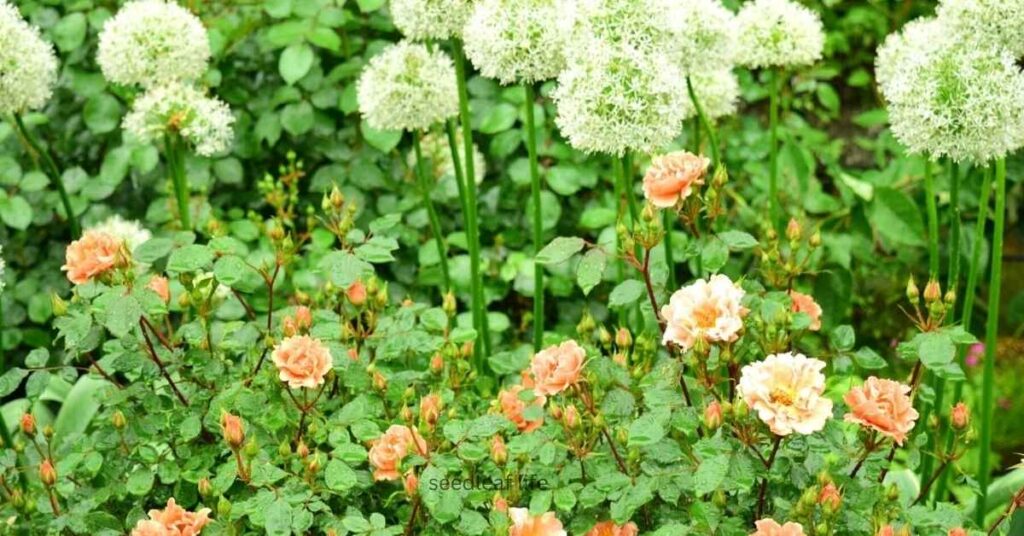
Roses often fall prey to various problems such as black spots and mildew, which weaken the plant. As a result, the quantity of flowers also decreases. Therefore, it is important to enhance protective measures. Rose companion plants are a simple and natural way to keep these problems under control, free from chemicals.
Garlic is a very popular and widely used vegetable that is highly beneficial all over the world. Its color is usually white or light pink. It has a strong aroma and flavor, slightly bitter yet delicious. Garlic and roses are best friends.
Pest Protection: The strong smell of garlic repels harmful insects that attack roses, such as aphids, spider mites, and whiteflies.
Disease Prevention: It has natural antifungal properties.
Soil Improvement: Garlic enriches the soil and supports the growth of surrounding plants. That’s why many gardeners plant garlic alongside roses.
Chives not only add a soft, grassy texture to the garden but also act as a shield against fungal infections. Their presence improves the overall resilience of rose bushes.
Onions, being close relatives of garlic and chives, work in much the same way. They enrich the soil and release compounds that deter harmful organisms, helping roses stay healthier for longer.
These protective companions form a natural barrier, reducing the need for chemical sprays and ensuring that your roses bloom with strength and vitality.
Herbs That Enrich Soil and Attract Beneficial Insects: Rose Companion Plants
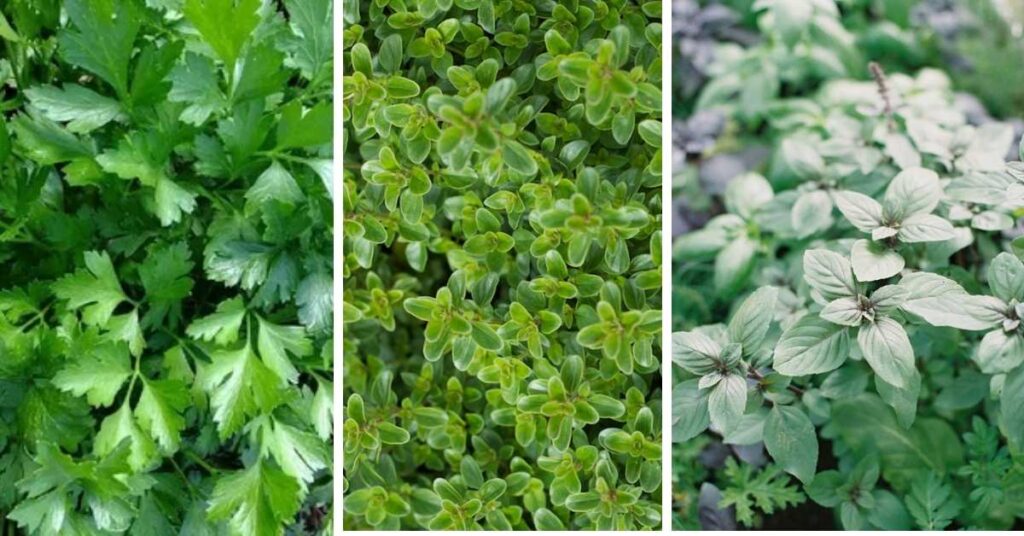
In a garden, companions for roses are not limited to flowers alone—many herbs also play an important role. These useful rose companion plants attract beneficial insects, which help protect the roses.
Parsley may look simple, but it plays a powerful role by attracting hoverflies, whose larvae feed on aphids that often trouble roses. It also enriches the soil with nutrients, supporting stronger plant growth.
Thyme spreads gently around the base of rose bushes, acting like a living mulch. It helps retain soil moisture, prevents weed growth, and attracts bees that boost pollination.
Basil is another herb that offers multiple benefits. Its strong aroma deters harmful insects while inviting pollinators to the garden. Basil is one of the perfect rose companion plants. Many gardeners also believe it enhances the fragrance of nearby roses. If you are interested in learning more about companion planting, you can also check our guide on Top 10 Tomato Companion Plants
Together, these herbs do more than just season your kitchen—they create a healthier environment for roses to thrive, naturally boosting both beauty and resilience.
Plants You Should Avoid as Rose Companion Plants
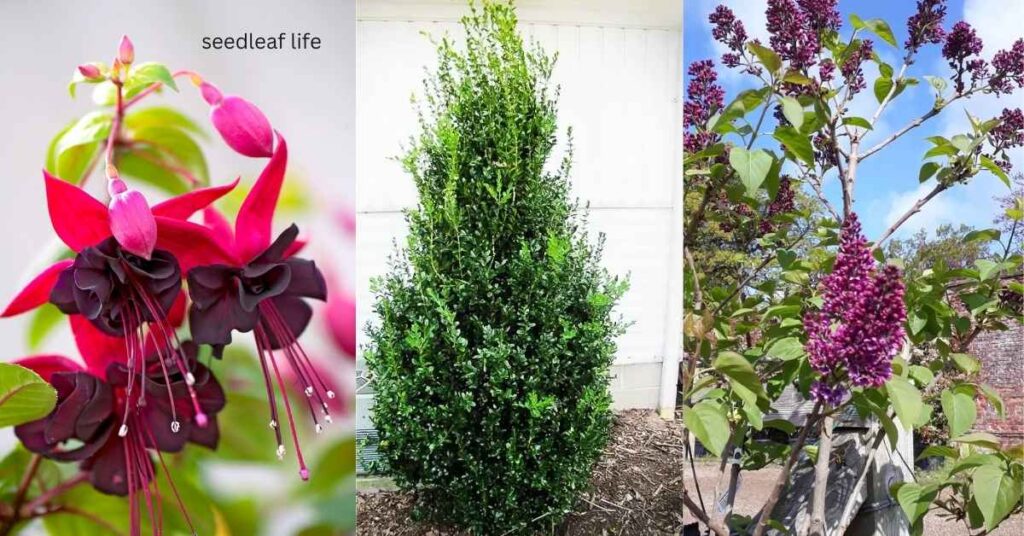
While many rose companion plants can support and protect roses, not every neighbor in the garden is a good match. Some plants compete for light, water, or nutrients, while others increase the risk of pests and diseases. To keep your rose bushes healthy, it’s best to avoid certain companions.
Fuchsias may look attractive, but they thrive in cooler, shaded spots. When planted near roses, they reduce air circulation and create damp conditions, which can encourage fungal problems.
Lilacs are beautiful shrubs, yet they compete heavily with roses for space and nutrients. Their dense foliage can also cast too much shade, preventing roses from getting the sunlight they need to bloom fully.
Large shrubs or trees should also be kept away from roses. Their deep roots absorb most of the water and nutrients in the soil, leaving little for roses. Moreover, the heavy shade they provide weakens rose growth and increases susceptibility to diseases.
By avoiding these unsuitable companions, you give your rose companion plants the best chance to flourish—free from unnecessary stress and competition.
Conclusion
Companion planting is more than just a gardening technique—it’s a way to create harmony in your rose garden. From protecting against pests and diseases to enriching the soil and attracting pollinators, the right choices bring lasting benefits.
By adding rose companion plants to your garden, you not only give your roses better protection but also enhance the beauty and fragrance of the entire space. These supportive partners make your garden healthier, more colorful, and full of life.
Now it’s your turn to try this approach. Which plant would you love to pair with your roses? To explore more examples of companions and plants to avoid, check out this guide on 20 Top Companion Plants for Roses

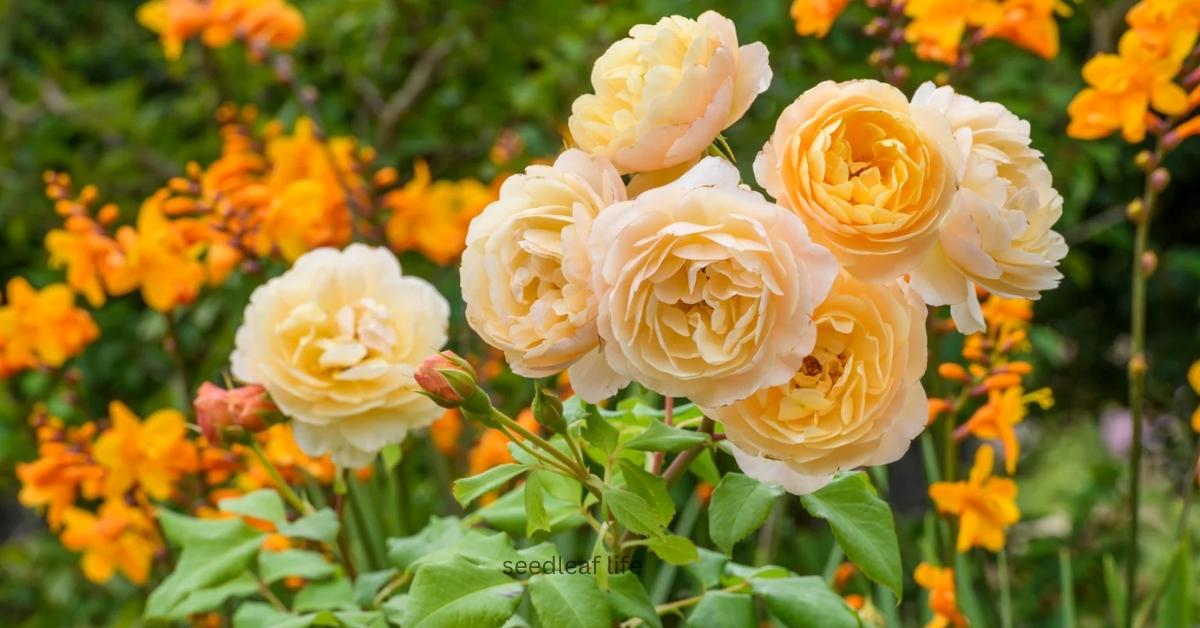
3 responses to “12 Best Rose Companion Plants: Boost Color & Healthy Growth”
[…] Seasonal flowers like pansies or cyclamen enhance the vibrant red berries during colder months. Learn how companion plants can improve garden health in our detailed article on rose companion plants […]
[…] addition to landscapes. They can be planted as standalone shrubs, in flower beds, or combined with companion plants to enhance their beauty and […]
[…] Basil not only makes tomatoes taste better but also helps protect them from harmful pests. Many gardeners believe that planting basil near tomatoes leads to a healthier, more productive harvest. If you love growing herbs that pair beautifully with flowers too, check out our guide on Rose Companion Plants. […]